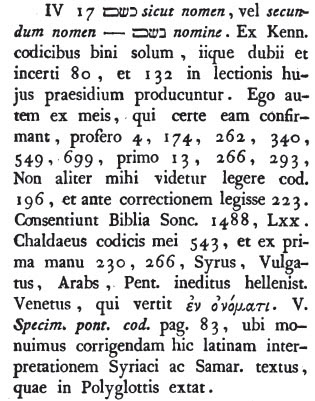וידע קין את אשתו ותהר ותלד את חנוך ויהי בנה עיר ויקרא שם העיר כשם בנו חנוך׃
Gen 4:17 [Samaritan]
וידע קין את אשתו ותהר ותלד את חנוך ויהי בנה עיר ויקרא את שם העיר כשם בנו חנוך׃
Gen 4:17 [Masoretic]
וַיֵּדַע קַיִן אֶת־אִשְׁתֹּו וַתַּהַר וַתֵּלֶד אֶת־חֲנֹוךְ וַֽיְהִי בֹּנֶה עִיר וַיִּקְרָא שֵׁם הָעִיר כְּשֵׁם בְּנֹו חֲנֹֽוךְ׃
And Qayin knew his wife, and she conceived and gave birth to Ḥanokh. And then he built a city, and called the name of the city after the name of his son, Ḥanokh.
Gen 4:17 [Targum Onkelos]
וִידַע קַיִן יַת אִתְּתֵיהּ וְעַדִּיאַת וִילֵידַת יַת חֲנוֹךְ וַהֲוָה בָּנֵי קַרְתָּא וּקְרָא שְׁמַהּ דְּקַרְתָּא כְּשׁוֹם בְּרֵיהּ חֲנוֹךְ:
And Qayin knew his wife, and she conceived and gave birth to Ḥanokh. And he became the builder of a city, and called the name of the city after the name of his son, Ḥanokh.
Gen 4:17 [Samaritan Targum]
וחכם קין ית אתתה ובטנת ואולדת ית חנוך והוה בנה קרתה וזעק ית שם מדינתה כשם ברה חנוך:
.
Gen 4:17 [Peshitta]
ܘܚܼܟܡ ܩܐܝܢ ܠܐܢܬܬܗ܂ ܘܒܛܢܼܬ ܘܝܠܼܕܬ܂ ܠܚܢܘܟ ܘܗܘܼܐ ܒܿܢܐ ܩܪܝܬܐ܂ ܘܩܼܪܐ ܫܡܗܿ ܕܩܪܝܬܐ ܥܠ ܫܡ ܒܪܗ ܚܢܘܟ܂
And Qayin knew his wife, and she conceived and gave birth to Ḥanokh. And then he built a city, and called the name of the city after the name of his son, Ḥanokh.
* ܚܼܟܡ = knew sexually
* ܩܪܝܬܐ also = village
Gen 4:17 [Septuagint]
Καὶ ἔγνω Κάιν τὴν γυναῖκα αὐτοῦ, καὶ συλλαβοῦσα ἔτεκεν τὸν Ἑνώχ. καὶ ἦν οἰκοδομῶν πόλιν καὶ ἐπωνόμασεν τὴν πόλιν ἐπὶ τῷ ὀνόματι τοῦ υἱοῦ αὐτοῦ Ἑνώχ.
And Kain knew his wife, and she became pregnant and gave birth to Henoch. And he built a city and named the city after the name of his son Henoch.
Gen 4:17 [Old Latin (Vetus Latina)]
Et cognovit Cain uxorem suam, et concipiens peperit Enoch : et erat aedificans civitatem in nomine filii sui Enoch.
And Cain knew his wife, and she conceived and gave birth to Enoch; and he built a city in the name of his son, Enoch.
Gen 4:17 [Vulgate]
Cognovit autem Cain uxorem suam, quae concepit, et peperit Henoch : et aedificavit civitatem, vocavitque nomen eius ex nomine filii sui, Henoch.
And Cain knew his wife, and she conceived and gave birth to Henoch; and he built a city, and called its name after the name of his son, Henoch.
* v.l. Henoch : Enoch
וַיֵּ֤דַע קַ֨יִן֙ אֶת־אִשְׁתֹּ֔ו וַתַּ֖הַר וַתֵּ֣לֶד אֶת־חֲנֹ֑וךְ וַֽיְהִי֙ בֹּ֣נֶה עִ֔יר וַיִּקְרָא֙ שֵׁ֣ם הָעִ֔יר כְּשֵׁ֖ם בְּנֹ֥ו חֲנֹֽוךְ׃
And Qayin knew his wife, and she conceived and bore Ḥanokh. And he was building a city, and he called the name of the city after the name of his son, Ḥanokh.
Morphology
- וַיֵּ֤דַע (wayyēḏaʿ) – Root: ידע (y-d-ʿ); Form: Qal wayyiqtol, third masculine singular; Translation: “And he knew”; Notes: Refers to the intimate knowledge of his wife.
- קַ֨יִן֙ (Qayin) – Root: קין (q-y-n); Form: Proper noun; Translation: “Qayin”; Notes: The subject of the action.
- אֶת־אִשְׁתֹּ֔ו (ʾeṯ-ʾišṯō) – Root: אשה (ʾ-š-h); Form: Direct object marker אֶת + noun, singular feminine with third masculine singular suffix; Translation: “his wife”; Notes: Refers to Qayin’s spouse.
- וַתַּ֖הַר (wattaḥar) – Root: הרה (h-r-h); Form: Qal wayyiqtol, third feminine singular; Translation: “and she conceived”; Notes: Indicates the beginning of pregnancy.
- וַתֵּ֣לֶד (wattēleḏ) – Root: ילד (y-l-d); Form: Qal wayyiqtol, third feminine singular; Translation: “and she bore”; Notes: Refers to giving birth.
- אֶת־חֲנֹ֑וךְ (ʾeṯ-ḥănōḵ) – Root: חנך (ḥ-n-k); Form: Direct object marker אֶת + proper noun; Translation: “Ḥanokh”; Notes: The name of Qayin’s son.
- וַֽיְהִי֙ (wayhî) – Root: היה (h-y-h); Form: Qal wayyiqtol, third masculine singular; Translation: “And he was”; Notes: Introduces the following action.
- בֹּ֣נֶה (bōneh) – Root: בנה (b-n-h); Form: Qal participle, singular masculine; Translation: “building”; Notes: Describes Qayin’s ongoing action.
- עִ֔יר (ʿîr) – Root: עיר (ʿ-y-r); Form: Noun, singular feminine; Translation: “a city”; Notes: Refers to the settlement being constructed.
- וַיִּקְרָא֙ (wayyiqrāʾ) – Root: קרא (q-r-ʾ); Form: Qal wayyiqtol, third masculine singular; Translation: “and he called”; Notes: Refers to Qayin naming the city.
- שֵׁ֣ם (šēm) – Root: שם (š-m); Form: Noun, singular masculine; Translation: “the name”; Notes: Refers to the designation of the city.
- הָעִ֔יר (hāʿîr) – Root: עיר (ʿ-y-r); Form: Noun, singular feminine with definite article ה; Translation: “of the city”; Notes: Specifies the subject being named.
- כְּשֵׁ֖ם (kĕšēm) – Root: שם (š-m); Form: Preposition כְּ + noun, singular masculine; Translation: “after the name of”; Notes: Indicates the basis for the naming.
- בְּנֹ֥ו (bĕnōw) – Root: בן (b-n); Form: Noun, singular masculine with third masculine singular suffix; Translation: “his son”; Notes: Refers to Ḥanokh.
- חֲנֹֽוךְ (ḥănōḵ) – Root: חנך (ḥ-n-k); Form: Proper noun; Translation: “Ḥanokh”; Notes: Repeats the name of the son after whom the city was named.
